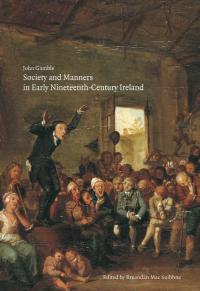Society and manners in early nineteenth-century Ireland
Published in 18th-19th Century Social Perspectives, 18th–19th - Century History, Book Reviews, Issue 1(Jan/Feb 2012), Reviews, Volume 20
Society and manners in early nineteenth-century Ireland
John Gamble, edited by Breandán Mac Suibhne
(Field Day, €45)
ISBN 9780946755431
Travel writings comprise a marvellous if problematic source for Irish scholars—especially for historians of pre-Famine Ireland. Arguably, these accounts can be grouped broadly into at least three categories. First are those, often written by foreign visitors, which focus on Irish poverty and ‘backwardness’, and frequently attribute them to English or landlord oppression. Historians sympathetic to Irish nationalism formerly drew extensively on such works. Second are the accounts, frequently penned by British travellers, which emphasise the ‘modernising’ features of pre-Famine Irish society, usually by stressing the benefits of the Act of Union, ‘improving’ landlords and a rising Catholic bourgeoisie. Needless to say, revisionist historians have relied heavily on these writings. Third are those few travel books, often written by Irish Protestants or Catholics, which are strikingly original and unusually rewarding. Despite their authors’ varied sympathies, these accounts provide information and insights that frequently challenge both popular and scholarly ‘myths’ about pre-Famine Irish society. Such are the three books written by the returned Ulster Presbyterian emigré John Gamble, published in London in 1811, 1813 and 1819. Long out of print and relatively underused, Gamble’s accounts are now republished by Field Day in one massive volume (716 pages), brilliantly edited and introduced by Breandán Mac Suibhne. Mac Suibhne is perhaps the foremost authority on the history of West Ulster, the focus of Gamble’s writings, and his c. 2,000 footnotes—which identify and illuminate almost every person, place, event, book and song mentioned by Gamble—represent monumental research. Gamble was born in 1770 in Strabane, Co. Tyrone, where religious and linguistic communities intermingled uneasily on both sides of the Foyle. Educated in Edinburgh, Gamble left Ulster in 1798, prior to the United Irish Rebellion, and served abroad as a physician in the British Army and the East India Company until he retired, owing to worsening eyesight, in 1807. For the next decade Gamble lived in London, where he wrote novels and plays, but he returned for lengthy visits to Ulster in 1810, 1812 and 1818, and penned accounts of his travels. In the latter year he retired permanently to Strabane, where he wrote his best novel, Charlton (1823), and in the vicinity of which he died in 1831. Gamble’s travels were limited to Ulster and, to a lesser degree, to Dublin and north-east Leinster, but his accounts are unusually rich (and sometimes quite witty). Gamble was remarkably free of both sectarian and class prejudice and, whether travelling by coach or (usually) on foot, he mixed equally and sympathetically—and often drank generously—with Protestants and Catholics of all social ranks. His knowledge of the Irish language made him an especially acute observer of life among the poor inhabitants of Ulster’s mountains. As Mac Suibhne notes in his eloquent and substantial (78 pages) introduction, however, Gamble’s abiding subject was the fate of his own Ulster Presbyterian community, the condition of which he sadly found ‘so altered’ since the 1798 Rebellion. Gamble was no republican—his political comments are often oblique and his feelings about the rebellion were deeply ambivalent. Nevertheless, he respected the United Irishmen’s idealism and sacrifices; he detested Orangeism for both its bigoted spirit and its violent provocations; and he strongly supported Catholic Emancipation. Most broadly, Gamble lamented the post-rebellion North’s ‘diseased state of public feeling’, in which the emerging official history (a lie) had silenced memory (the truth) or banished it to America. As a result, Gamble’s travels moved through a darkening twilight, ‘in the spectral afterworld of failed revolution’, haunted by ‘the ghost[s] of former days’. In future, as Mac Suibhne suggests, ‘true stories’ about the past could only be told if literally disguised as ‘ghost stories’. In part, Gamble’s observations were coloured by personal melancholia, reflecting his encroaching blindness, and by the Gothic mood of much contemporary fiction. Nevertheless, as Gamble observed, the North of Ireland had changed profoundly, and for most of its inhabitants—especially its Presbyterians—quite negatively, since the relatively prosperous and politically hopeful years before 1798, the Act of Union and the terrible economic crisis, compounded by famine and typhus, that commenced in 1814–15. Thus Gamble described a Presbyterian community that was crippled economically and socially (especially in 1818) by depression and by the onset of rural deindustrialisation and depopulation; impoverished culturally by evangelicalism and by censorship (both self- and externally imposed); poisoned politically by the Tory alliance between landlordism and sectarianism; and fragmented by both urban/rural and social-class differentiation, which (alongside increased state payment to the Presbyterian clergy) was creating a new post-Union bourgeoisie, whose members identified their status, interests and ambitions with ‘the glory [and profits] of being Britons’.Thus, as Mac Suibhne notes, one of Gamble’s major points is that, for northern Presbyterians, Irish republicanism had not been ‘an import from America or France’, or ‘the creation of a few middle-class politicians’. Rather, it had been ‘deeply rooted in society and manners and the experience of bad government’: hence the communal trauma wrought by its destruction—the vacuum left by its obliteration in public and, eventually, even in private memory. Another main point, by implication, is that Ulster Presbyterians’ ultimate transition to ‘loyal’ unionism was neither rapid nor easy, neither ‘natural’ nor ‘inevitable’; indeed, one major cause was the massive post-1815 migration to America of those who, in Gamble’s words, were ‘borne down by poverty and oppression’, and regarded Ireland’s government ‘with a feeling, for which hatred is but a feeble word’. HI
Kerby A. Miller is Curators’ Professor of History at the University of Missouri.
















